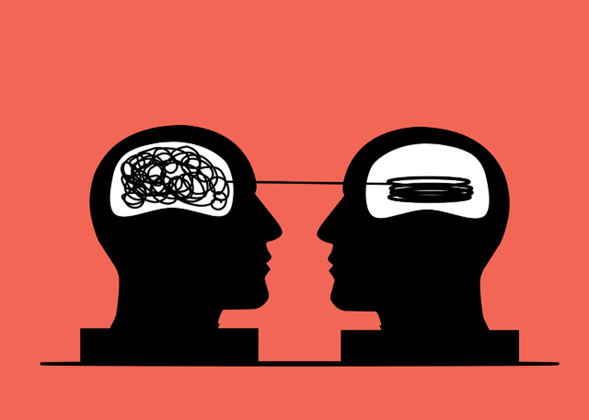
Stress refers to the physiological and psychological response that a person experiences when faced with external demands or pressures, known as stressors, which they perceive as challenging or threatening to their well-being. These stressors can be of a physical nature, such as an accident or illness, or psychological, such as work problems or personal conflicts.
The response to stress involves the activation of the autonomic nervous system and the release of stress hormones, such as cortisol and adrenaline. In the short term, stress can be adaptive as it prepares us to cope with challenging situations. However, when stress becomes chronic or overwhelming, it can have negative effects on physical and mental health.
Depression, on the other hand, is a mood disorder characterized by persistent feelings of sadness, loss of interest or pleasure in activities, sleep and appetite disturbances, fatigue, difficulty concentrating, and low self-esteem. These symptoms often significantly interfere with the person's daily functioning and can last for weeks, months, or even years.
It is important to note that depression is not simply feeling sad for a short period of time but involves a persistent depressive mood and a significant decrease in the ability to enjoy and participate in everyday life.
Link between Stress and Depression
Chronic stress can play a significant role as a risk factor for the development of depression. While not everyone who experiences stress develops depression, there is a considerable association between the two phenomena.
Chronic stress, which involves continuous exposure to stressful situations over an extended period, can have detrimental effects on mental health. When a person faces persistent stressors such as work problems, financial difficulties, interpersonal conflicts, or past traumas, it can trigger a constant stress response in their body.
This chronic stress response brings about changes in the nervous system and the release of stress hormones, such as cortisol. These changes can affect the brain's chemical balance and alter neurotransmitters like serotonin, which play a significant role in mood regulation.
Furthermore, chronic stress can contribute to the emergence of negative thoughts, dysfunctional thinking patterns, and a pessimistic outlook on life. This can weaken a person's ability to cope with difficulties, increase feelings of hopelessness, and trigger depressive symptoms.
The relationship between stress and depression is complex and bidirectional. Not only can chronic stress increase the risk of developing depression, but depression can also influence the perception and response to stress. People with depression may have difficulties in properly coping with stressors, which can lead to a continuous cycle of stress and depression.
Stress Management Strategies:
Managing stress in a healthy way is crucial to reduce its negative impact on our mental health and prevent the onset of depression. Here are some strategies and techniques that have been shown to be effective:
Exercise
Regular physical exercise is an excellent way to reduce stress. Physical activity releases endorphins, hormones that generate feelings of well-being and decrease the sense of stress. Additionally, exercise can improve sleep quality, increase energy, and promote a state of relaxation.
Meditation and relaxation techniques
Meditation, mindfulness, and other relaxation techniques such as deep breathing and visualization can help calm the mind and reduce stress. These practices foster mindfulness and awareness of the present moment, which can decrease anxiety and promote relaxation.
Cognitive-Behavioral Therapy (CBT)
Cognitive-Behavioral Therapy is a form of psychological therapy that has been shown effective in stress management and depression prevention. CBT helps identify and modify negative and distorted thought patterns, as well as develop healthy coping skills and problem-solving strategies.
Setting boundaries and priorities
Learning to set appropriate boundaries and prioritize our responsibilities can be crucial in reducing stress. Sometimes, we overload ourselves with too many tasks and commitments, leading to feeling overwhelmed. Learning to say "no" when necessary and focusing on what truly matters can help alleviate stress and prevent depression.
Healthy lifestyle
Adopting a balanced lifestyle is essential for effectively managing stress. This includes getting enough sleep, maintaining a balanced and nutritious diet, avoiding excessive alcohol and caffeine consumption, and dedicating time to leisure and relaxation activities.
By practicing these stress management strategies regularly, you can reduce its negative impact on your mental health and decrease the risk of developing depression. However, if you experience persistent depressive symptoms, it is important to seek professional help.
Multidisciplinary Approach:
The relationship between stress and depression is complex and requires a multidisciplinary approach.
A counselor can conduct a comprehensive assessment of your situation, listening to your concerns and symptoms. Through interviews and questionnaires, they can help you identify whether you are experiencing stress or if there are depressive symptoms present. This can provide clarity and a solid foundation for treatment
Psychology investigates the cognitive and behavioral processes related to stress and depression.
Neuroscience delves into the biological mechanisms underlying stress and depression, analyzing changes in the brain and neurotransmitter systems.
Medicine addresses the physical and physiological aspects, evaluating and treating underlying medical conditions.
The collaboration between these fields allows for a more comprehensive understanding of the relationship between stress and depression, identifying mechanisms, risk and protective factors, and effective interventions. The multidisciplinary approach also promotes the integration of different therapies, such as cognitive-behavioral and pharmacological, tailored to individual needs. In summary, addressing stress and depression requires a comprehensive approach that combines knowledge from different disciplines.
In conclusion, the relationship between stress and depression is undeniably complex and multidimensional. Throughout this article, we have explored key points that demonstrate how chronic stress can be a significant risk factor for the development of depression. While not everyone who experiences stress develops depression, there is a significant association between the two phenomena.
By understanding the relationship between stress and depression, as well as strategies for their management and prevention, we can work towards better mental health and well-being. By adopting a comprehensive and multidisciplinary approach, we can effectively address these challenges and help individuals overcome stress and prevent depression, thus promoting a healthier and more fulfilling life.
REFERENCES:
www.webmd.com/depression/features/stress-depression#
www.altonivel.com.mx/estilo-de-vida/la-relacion-entre-el-estres-y-la-depresion/
https://lamenteesmaravillosa.com/el-estres-cronico-y-la-depresion-como-se-relacionan/